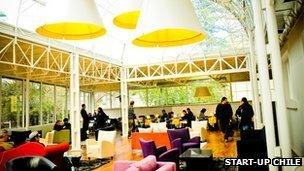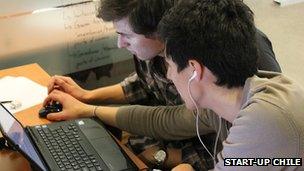Starting up in Chile, not Silicon Valley
- Published

George Cadena's solar energy firm was attracted by help for start-ups, and sun in the Atacama desert
Just over a year ago, George Cadena from Los Angeles, California, packed up his solar-panel startup Aeterna Sol and hit the road less taken.
Before waving goodbye to California "I had to Wikipedia Santiago," says Mr Cadena, who has his master's in electrical engineering from Caltech University. The search results shattered his "drugs and corruption" image of Chile and Latin America.
Unfazed by his nonexistent Spanish skills, which throughout his life had rendered him incapable of communicating with his monolingual Bolivian grandmother, the twenty-nine-year-old signed on with Start-Up Chile (SUP).
SUP dangled a $40,000 grant as a carrot, tore down government red tape, and hurried one-year visas to entice 25-handpicked start ups to bootstrap their businesses in Chile for six months.
Hot commodity
SUP is government-sponsored. Its goal is to put Chile on the map as an innovation hub for entrepreneurs. A promotional video on SUP's website spells out the mission: "They arrive. They work. They connect. They leave, and Chile stays connected."

Start-Up Chile's offices, but with more than a hint of Silicon Valley
Thirteen months later, nine of the 22 start ups that came to Chile never completed the "they leave" part. They opted to stay put.
Immigrant entrepreneurs are a hot commodity. Between 1995 and 2005, immigrants are said to have started up about half of the new businesses created in Silicon Valley. The United States, the UK and Greece, vying to draw multi-national entrepreneurs of their own, recently launched similar start-up programmes.
The SUP entrepreneurs agree that the Chilean government is friendly to business, but it isn't the low 20% corporate tax rate that seduces them to stay.
At the outset, only a "small minority had intention of staying," says Mr Cadena, but SUP created a "summer camp environment; real solid friendships are formed here."
The buzz
SUP's new headquarters in Providencia, Santiago, buzzes with dozens of young entrepreneurs. The half historical mansion and half glass-box lounge houses the second round of 87 start ups and a handful of the original 22. The entrepreneurs hunch over their laptops clustered around highly organised tables, sporting techy t-shirts and cordless headphones.
"What's important is what you can do with the network of people created by this programme. They give us hints and helps," says Tiago Matos, who came from Portugal's second-largest city Porto. He co-founded Vennder, a trilingual site that sets up storefronts, which he describes as "[free blogging website] Blogger for small businesses."
Recently, he needed a lawyer in the US. After a quick conversation with a North American start up in the SUP programme, the problem was solved.
When he and Portugal parted ways in 2010, Vennder hosted about 200 stores. Now he has 3,500 customers - 15% of which are Chilean.
He attributes the jump to translating his site into Spanish and English, and to SUP's connections, which rooted Vennder in Chile.
Chilean money for foreigners?
SUP put Mr Matos in touch right away with local design company Oflow, and the two have been working together ever since.
"Chile is a small country. When you know the right people, you can get started. In other countries, it can be hard to meet the right people," says 29-year-old entrepreneur Enrique Fernandez from Vina del Mar in Chile.
He co-owns SupplierSync, an online social marketplace for buyers and sellers. SUP originally picked only foreign applicants, but Mr Fernandez made the cut because he lived abroad when he applied.
Some faulted the program for forking over government funds to foreigners, but since round two "globally-minded" start ups from Chile can apply as well.
Brenna Loury, who works for SUP, says "we're a start up ourselves, you can't imagine the times we've changed things." She adds that having 40% of start ups decide to stay was "a surprise for us; we didn't know what to expect - it was really cool for us and really inspiring."
The feeling was mutual for most of the entrepreneurs. "Santiago is the place to address Latin American markets," says Tiago Matos of Vennder.
Mr Cadena echoes the sentiment: "I've never seen anything like this... this is history book material. It's like a star hub for every other country in the world."
Making entrepreneurship 'trendy'
Enrique Fernandez says that in Chile the terms "entrepreneurship" and "innovation" are now seen as "trendy". Universities here - similar to the US - are leading the pack.
Students from Pontificial Catholic University in Santiago recently won an international competition of student entrepreneurs held in in the United States. They beat teams from Austria, Canada, Chile, France, the UK and the US to take home a $25,000 prize.
"Young Chileans thought that they should work for a big company. That is changing. Now, maybe they want to work somewhere more flexible," says Javier Parajo, and entrepreneur from Argentina. He was in SUP's first intake and co-owns Junar, a data-extraction website.
Getting things done
Rather than staring at the clock during the testing phase of his solar-panel-tracking technology in Chile's Atacama Desert, George Cadena is attempting to capitalise on his situation. Together with five other SUP entrepreneurs he has created 'De Emprededores, Para Emprededores' (By Entrepreneurs, For Entrepreneurs), or De-Pe. They offer entrepreneurship classes for beginners.
Mr Cadena met with Unversidad Catolica, one of Chile's top universities, who jumped at the offer to start an entrepreneurship class, he said.
"That's the other thing, you can get things started so fast," he says - convinced that at his alma mater Caltech the same idea would have been much slower to catch on. "Schools in the US wouldn't be as receptive as they are in Chile," he says.
However, the international connections have yet to turn into a job generator for Chileans. The programme is still in its infancy, and so far the entrepreneurs have hired just 134 locals.
Culture clash
"The bridge between local entrepreneurs and Start-Up is still pretty far," says Mr Cadena.
Communication can be challenging, although SUP helps to smooth things out, the entrepreneurs say. "To really do business here you have to speak Spanish," says Mr Cadena. On the upside, Chilean business culture can be friendlier to foreigners than family: "Chileans will buy from foreigners before they buy from Chileans nine times out of ten."
Jorge Diaz, 36 years old and from Asturias in Spain, owns social-networking and gastronomy website Yumit, where users upload pictures of their favourite dishes and places to eat.
"You have to understand how Chile works," he says. "If it's popular in Spain, it becomes a bit popular in Latin America." But it's harder for Chilean business to swim up the economic food chain because "to be popular in the US, you have to launch in the San Francisco area."
The number of Yumit's users has doubled to 5,000 since Mr Diaz came to Chile. 100% of the growth has come from Latin America. He credits the Chilean media's ample coverage of SUP with boosting the visibility of his site.

Tax incentives help, but entrepreneurs value the Networking
Without pausing for a breath, Mr Diaz rattles off a list of can't-miss restaurants within blocks of SUP's new office. He raves about a small German restaurant across the street. "I'm not interested in going back to Europe. I'd rather stay here in Latin America," he says.
Vying for attention
The SUP programme is now attracting some international attention, but according to Javier Parajo, this has yet to improve his company's bottom line.
US media have covered his data extraction website, he says: "Perhaps it's a validation that you've been selected by a well-known entity, but for business, no it hasn't helped."
If his Start-Up status comes up, potential US customers respond: "yes, how interesting. Show me the money."
The SUP entrepreneurs may meet to talk tech and sip piscola, a cocktail popular across Chile. But getting the word out from Chile to the US is a big hurdle for Mr Parajo - and that's why his partner relocated to Silicon Valley after the program was over. He only stayed behind in Santiago because he had trouble getting a US visa.
Still, since joining the programme he managed to get a $1.2m investment, plus access to "funds from the government, subsidies and a growing venture capital industry. Such things don't exist in my country."
It's too early to say whether SUP will persuade many more foreign start-ups to come to Chile, but Mr Cadena believes that is has opened the mind of fellow Californians about coming to Santiago.
Vivek Wadhwa, a visiting scholar at the University of California, Berkeley, acts as a consultant for SUP. He points to the fact that 40% of the pilot group decided to stay in Chile.
"The idea is to fertilise the local landscape with new ideas and ambitious people. This is a win-win. If all goes according to plan, we will have a thriving innovation hub in Chile - Silicon Valley South."
Katie Manning reports for Mi Voz, external, a group of citizen journalism websites across Chile